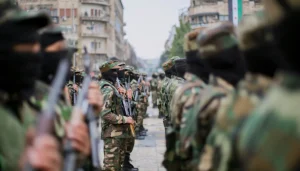Alors que la guerre israélienne dans la bande de Gaza approche de sa troisième année, Tel-Aviv se trouve plongée dans un dilemme stratégique complexe, révélant les contradictions entre les ambitions politiques du gouvernement de Benjamin Netanyahu et les considérations sécuritaires et militaires imposées par la réalité sur le terrain.
Le plan promu par Netanyahu et ses partisans au sein de la coalition au pouvoir, visant à occuper la ville de Gaza, se heurte à la vision de l’establishment sécuritaire. Eyal Zamir, chef d’état-major israélien, a averti que cette option pourrait transformer Gaza en un front d’épuisement ouvert, en plus de menacer directement la vie des otages restants. La question est : Netanyahu peut-il risquer de confronter l’institution militaire alors qu’il a le plus besoin de cohésion interne ?
Le dilemme plus profond réside dans la tentative de concilier deux objectifs contradictoires : récupérer les otages d’une part et obtenir une résolution militaire d’autre part. Bien que ces deux objectifs représentent une demande populaire large, les atteindre simultanément semble presque impossible, ce qui a généré une division interne aiguë. L’opposition appelle à accepter les initiatives internationales, à avancer dans un échange de prisonniers et à un cessez-le-feu, ouvrant la voie à l’établissement d’une nouvelle administration palestinienne à Gaza. Netanyahu rejette cela, craignant que cette voie ne conduise à la renaissance du projet d’État palestinien indépendant avec un soutien international sans précédent.
Cette division reflète une crise plus profonde dans la structure du système politique israélien, où les calculs partisans et de coalition ont pris le pas sur l’intérêt stratégique. De nombreux observateurs estiment que Netanyahu équilibre soigneusement ses pas pour éviter la chute de son gouvernement plus qu’il ne cherche réellement à mettre fin à la guerre. Ce comportement fait de la guerre une otage de la politique intérieure et ouvre la porte à des erreurs stratégiques dont le coût pourrait être multiplié à long terme. Sur le plan interne, la crise du recrutement des Haredim s’aggrave, l’armée faisant face à une grave pénurie de main-d’œuvre, tandis que les partis religieux alliés au gouvernement refusent toute atteinte aux exemptions des étudiants des instituts religieux.
Cette contradiction entre les nécessités de sécurité et les intérêts politiques aggrave la fragilité de la coalition au pouvoir et place Israël devant un dilemme de répartition équitable des charges de la guerre entre ses composantes.
Sur la scène internationale, Donald Trump, le président américain, apparaît comme un acteur clé. Depuis son retour à la Maison-Blanche en janvier 2025, il continue d’affirmer son soutien militaire à Israël mais insiste en même temps sur le fait que la poursuite de la guerre sans horizon politique nuit à l’image d’Israël et affaiblit ses alliances. Ses récentes déclarations, prévoyant une fin prochaine du conflit, ont ouvert une autre question : Israël peut-elle ignorer les pressions américaines et internationales croissantes sans perdre sa position stratégique à long terme ?
Ces défis politiques et sécuritaires s’accompagnent de défis économiques croissants, représentés par la baisse des investissements et les dommages à des secteurs vitaux tels que le tourisme et l’industrie, à un moment où le coût de la guerre a augmenté de manière sans précédent. Ainsi, la nécessité de rouvrir l’économie et de relancer la production est devenue une question urgente, non moins importante que tout succès militaire potentiel.
En conclusion, Israël se trouve à un carrefour historique : soit elle s’accroche à une option militaire qui prolonge le conflit et l’enfonce dans l’isolement international, soit elle s’engage dans un processus politique sérieux avec les Palestiniens qui ouvre des perspectives d’intégration régionale et de stabilité économique et sociale.













Recommended for you
مدينة المعارض تنجز نحو 80% من استعداداتها لانطلاق معرض دمشق الدولي
طالب الرفاعى يؤرخ لتراث الفن الكويتى فى "دوخى.. تقاسيم الصَبا"
تقديم طلبات القبول الموحد الثلاثاء و640 طالبا سيتم قبولهم في الطب
البريد المصري: لدينا أكثر من 10 ملايين عميل في حساب التوفير.. ونوفر عوائد يومية وشهرية وسنوية
سمو الشيخ عيسى بن سلمان بن حمد آل خليفة يستقبل سفير الولايات المتحدة الأمريكية لدى مملكة البحرين
الجغبير: القطاع الصناعي يقود النمو الاقتصادي